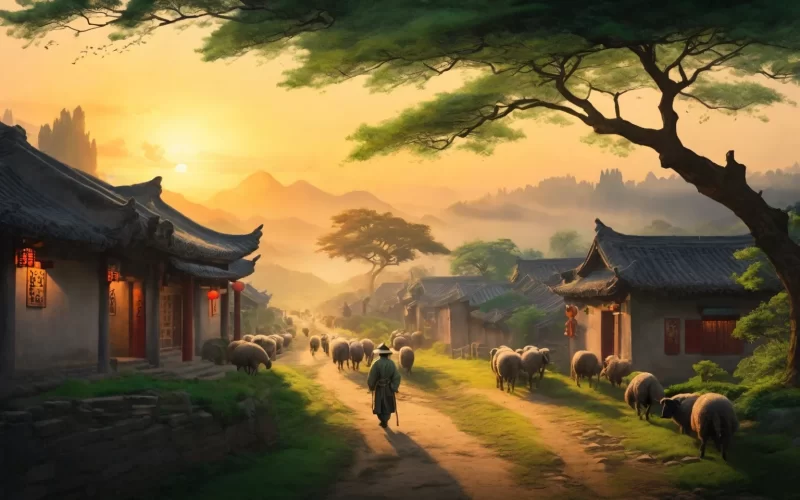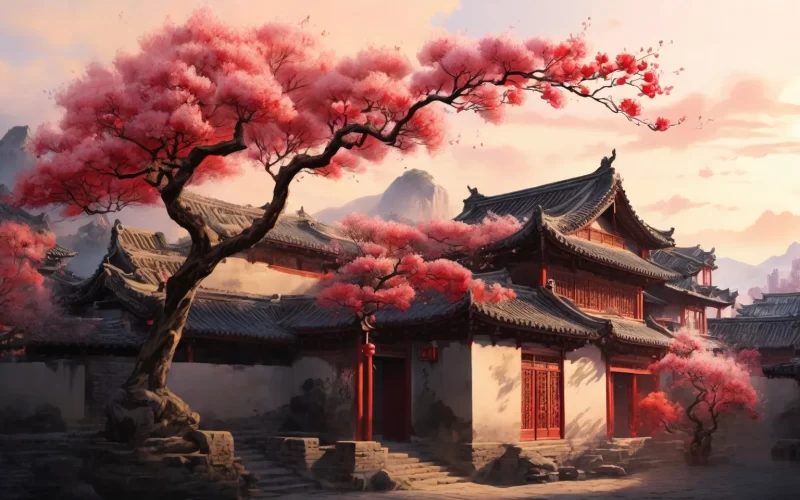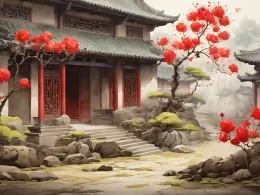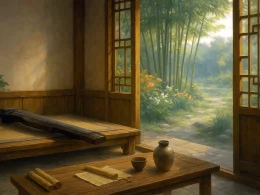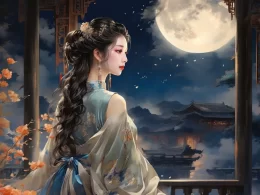As the years go by, give me but peace,
Freedom from ten thousand matters.
I ask myself and always answer:
What can be better than coming home?
A wind from the pine-trees blows my sash,
And my lute is bright with the mountain moon.
You ask me about good and evil fortune?....
Hark, on the lake there's a fisherman singing!
Original Poem
「渭川田家」
王维
斜光照墟落,穷巷牛羊归。
野老念牧童,倚杖候荆扉。
雉雊麦苗秀,蚕眠桑叶稀。
田夫荷锄立,相见语依依。
即此羡闲逸,怅然吟式微。
Interpretation
Composed around 736 AD during Emperor Xuanzong's Kaiyuan era, this poem emerged from Wang Wei's political disillusionment after his patron Zhang Jiuling's dismissal from the chancellorship. Wandering through the Wei River valley at dusk, the poet encountered a pastoral homecoming scene that stirred profound longing, compelling this spontaneous composition. Blending meticulous rural observations with subtle career frustrations, the verses achieve remarkable emotional authenticity.
First Couplet: "斜光照墟落,穷巷牛羊归。"
Xié guāng zhào xū luò, qióng xiàng niú yáng guī.
Slanting light bathes the village lanes;
Through narrow alleys, herds return home.
This establishing shot captures the golden-hour tranquility of rural life. The "slanting light" (斜光) and "narrow alleys" (穷巷) create spatial depth, while the homebound livestock establish cyclical rhythms of agrarian existence—a cinematic overture to the pastoral symphony.
Second Couplet: "野老念牧童,倚杖候荆扉。"
Yě lǎo niàn mù tóng, yǐ zhàng hòu jīng fēi.
An old man longs for his shepherd boy,
Leaning on staff by the thornwood gate.
The focus tightens to human detail: the elderly villager's patient vigil embodies intergenerational care. The "thornwood gate" (荆扉) becomes both physical threshold and symbolic portal between Wang Wei's bureaucratic world and this organic community.
Third Couplet: "雉雊麦苗秀,蚕眠桑叶稀。"
Zhì gòu mài miáo xiù, cán mián sāng yè xī.
Pheasants call through ripening wheat;
Silkworms sleep beneath thinning mulberries.
Nature's particulars mark seasonal transition (late spring/early summer). The parallel structure contrasts avian vitality ("pheasants call") with insect dormancy ("silkworms sleep"), while "ripening" and "thinning" suggest agriculture's impermanent perfections.
Fourth Couplet: "田夫荷锄立,相见语依依。"
Tián fū hè chú lì, xiāng jiàn yǔ yī yī.
Hoes on shoulders, farmers pause,
Exchanging lingering words at day's end.
The communal portrait culminates in farmers' unhurried interactions. "Lingering words" (语依依) radiates warmth, contrasting sharply with court officials' calculated discourse—a silent critique of political life.
Fifth Couplet: "即此羡闲逸,怅然吟式微。"
Jí cǐ xiàn xián yì, chàng rán yín Shì Wēi.
Here I covet such unhurried peace,
Chanting 'Decline' with wistful breath.
The emotional pivot: Wang Wei's recitation of the Book of Songs's "Decline" (式微)—originally lamenting a minister's fallen fortunes—transforms pastoral admiration into personal allegory. The sigh "wistful breath" (怅然) confesses his bureaucratic exile while celebrating rural autonomy.
Holistic Appreciation
Through ten meticulously crafted lines, Wang Wei constructs a visual pilgrimage from panoramic village views to intimate human moments, finally arriving at existential revelation. The poem's power derives from strategic absence—nowhere does it directly mention political grievances, allowing the radiant pastoral scenes to underscore by contrast the poet's spiritual displacement. This negative capability makes the final Shi Wei allusion resonate with amplified sorrow.
Artistic Merits
This poem employs the quintessential technique of "expressing emotion through scenery" and "projecting sentiment onto objects." Rather than directly voicing his melancholy over career setbacks, the poet subtly contrasts his own turmoil in officialdom with the leisurely life of rural households, revealing his quiet admiration and yearning.
The language is refreshingly natural, with seamless transitions between scenes and a gentle, unhurried rhythm that creates strong visual and emotional tension. The concluding allusion to "Why Not Return Home?" (《式微》) elevates the poem’s emotional climax with understated elegance, embodying Wang Wei’s signature aesthetic of "subtle profundity" (淡远深沉)—where restraint and depth coexist in perfect harmony.
Insights
Wang Wei's poem articulates an eternal urban-rural dialectic—the intellectual's yearning for unmediated existence amidst cultivated landscapes. For modern readers, it poses urgent questions: Where lies our contemporary "thornwood gate"—the threshold between obligation and authenticity? How might we, like Wang Wei, find redemptive attention in life's ordinary homecomings? The poem ultimately suggests that political disillusionment and pastoral idealization are not opposites, but interdependent consciousnesses.
Poem translator
Kiang Kanghu
About the poet

Wang Wei (王维), 701 - 761 A.D., was a native of Yuncheng, Shanxi Province. Wang Wei was a poet of landscape and idylls. His poems of landscape and idylls, with far-reaching images and mysterious meanings, were widely loved by readers in later generations, but Wang Wei never really became a man of landscape and idylls.





